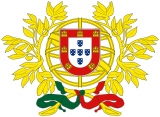
Back رئيس وزراء البرتغال Arabic Primer ministre de Portugal Catalan Premiér Portugalska Czech Premierminister (Portugal) German Primer ministro de Portugal Spanish Portugali peaminister Estonian Portugalin pääministeri Finnish Premier ministre du Portugal French Primeiro ministro de Portugal Galician ראש ממשלת פורטוגל HE
| Prime Minister of the Portuguese Republic | |
|---|---|
| Primeiro-Ministro da República Portuguesa | |
 Government logo | |
 | |
since 2 April 2024 | |
| Council of Ministers of Portugal Government of Portugal | |
| Style | Mr Prime Minister (informal) His Excellency (diplomatic) |
| Type | Head of government |
| Member of | |
| Residence | Palacete de São Bento |
| Seat | Lisbon, Portugal |
| Appointer | President |
| Term length | No term limit |
| Inaugural holder | Pedro de Sousa Holstein, 1st Duke of Palmela |
| Formation | 24 September 1834 |
| Salary | €70,023.52 annually[1] |
| Website | portugal.gov.pt |
 |
|---|
| Constitution |
The prime minister of Portugal (Portuguese: primeiro-ministro; pronounced [pɾiˈmɐjɾu miˈniʃtɾu]) is the head of government of Portugal. As head of government, the prime minister coordinates the actions of ministers, represents the Government of Portugal to the other bodies of state, is accountable to parliament and keeps the president informed. The prime minister can hold the role of head of government with the portfolio of one or more ministries. As Portugal is a semi-presidential parliamentary republic, the prime minister is the country's leading political figure and de facto chief executive.
There is no limit to the number of terms a person can serve as prime minister. The prime minister is appointed by the president following legislative elections, after having heard the parties represented in the parliament. Usually, the person named is the leader of the largest party in the previous election, but there have been exceptions over the years.
- ^ Miguel Santos (23 September 2015). "E agora um tema sensível: os políticos são mal pagos?". Observador (in Portuguese). Lisbon. Retrieved 12 October 2016.
O mesmo se aplica ao primeiro-ministro: este ano, Pedro Passos Coelho recebe um salário mensal de 5.001,68 euros brutos, menos 12% do que recebia em 2010, antes dos cortes.
